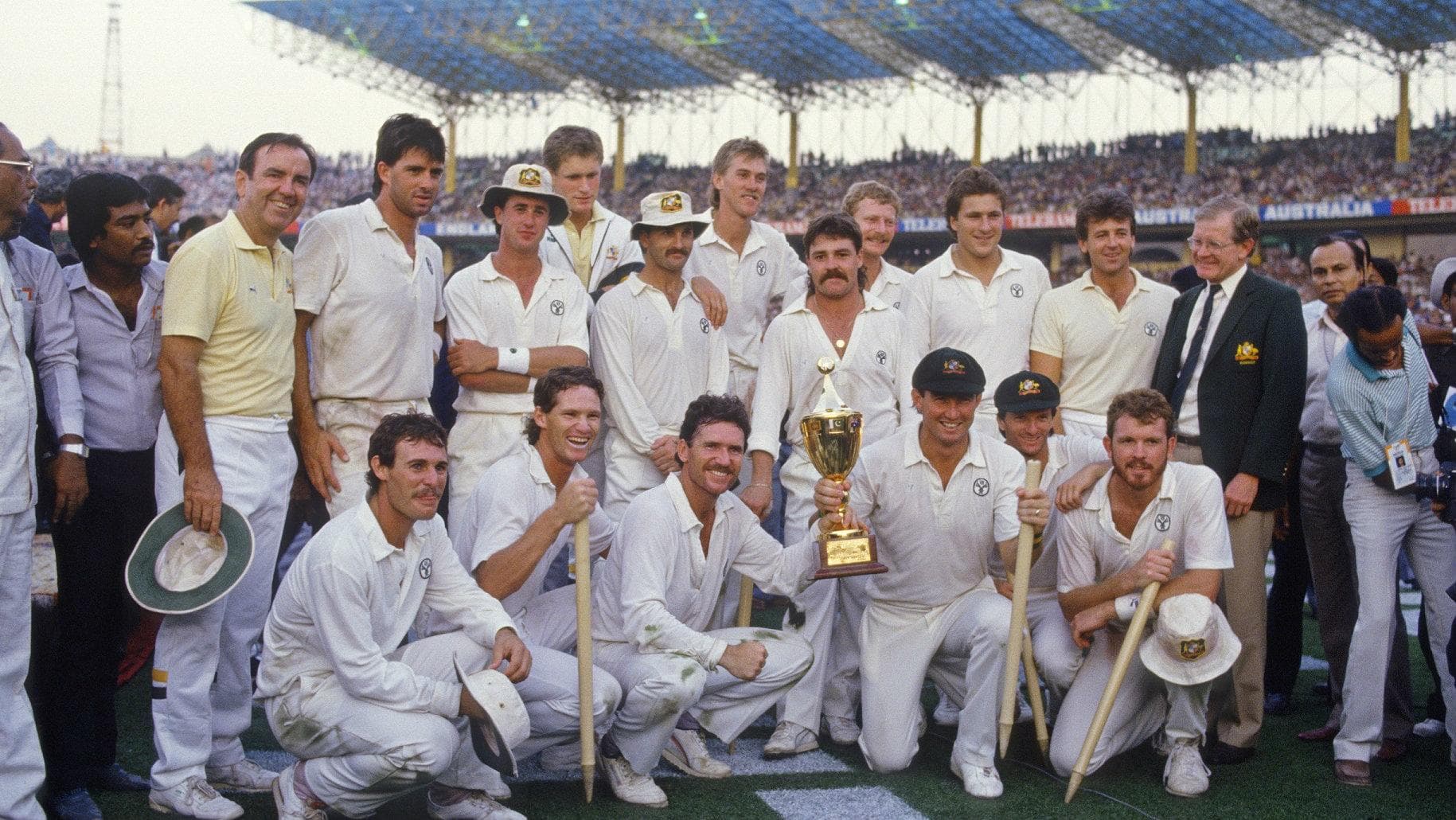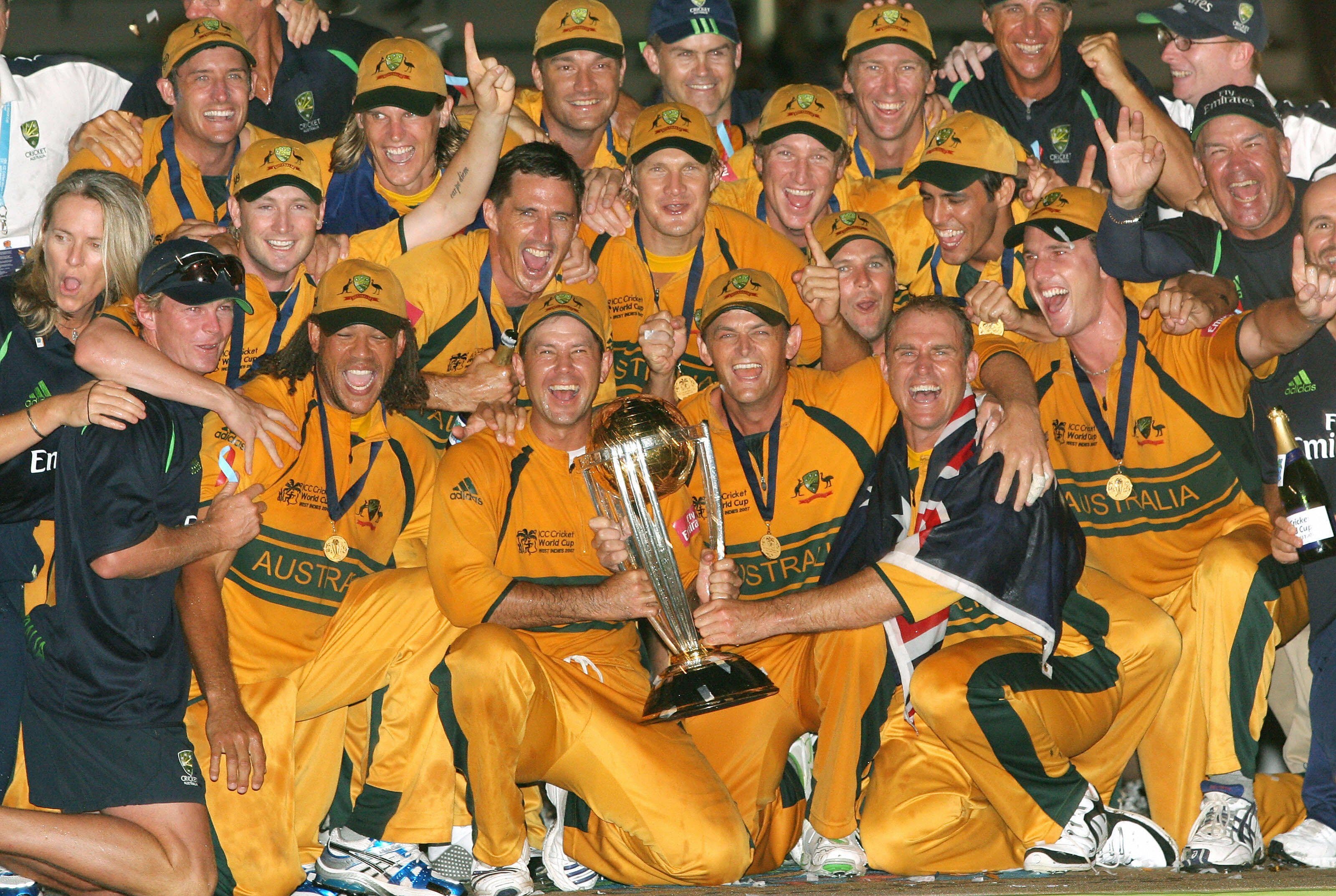Cricket
How Many World Cup Australia Won in Cricket
Australia have won six Men’s 50 over cricket World Cups, most by any team. They defeated India to win the 2023 World Cup.

Australia is the most successful team in ODI World Cup history winning the title on 6 occasions. The team most recently won the 2023 edition concluded in India by defeating the strong contenders and hosts India by 6 wickets at Narendra Modi Stadium in Ahmedabad. Australia won the World Cup in cricket after a wait of eight years. Let’s look at the team’s successful World Cup campaigns.
AUSTRALIA
IN ODI WORLD CUPS
| WORLD CUP | HOSTS | POSITION | CAPTAIN |
|---|---|---|---|
| 1975 | ENGLAND | RUNNERS UP | IAN CHAPPELL |
| 1979 | ENGLAND | GROUP STAGE | KIM HUGHES |
| 1983 | ENGLAND | CHAMPIONS | KIM HUGHES |
| 1987 | IND, PAK, | GROUP STAGE | ALLAN BORDER |
| 1992 | AUSTRALIA, NZ | GROUP STAGE | ALLAN BORDER |
| 1996 | IND, PAK, SL | RUNNERS UP | MARK TAYLOR |
| 1999 | ENGLAND | CHAMPIONS | STEVE WAUGH |
| 2003 | SOUTH AFRICA | CHAMPIONS | RICKY PONTING |
| 2007 | WEST INDIES | CHAMPIONS | RICKY PONTING |
| 2011 | IND, SL, BAN | QUARTER FINALS | RICKY PONTING |
| 2015 | AUS, NZ | CHAMPIONS | MICHAEL CLARKE |
| 2019 | ENGLAND | SEMI FINALS | AARON FINCH |
| 2023 | INDIA | CHAMPIONS | PAT CUMMINS |
1987 World Cup | Captain: Allan Border
 After finishing as runners-up in the inaugural 1975 World Cup, the team struggled in the next two World Cups, failing to advance past the group stage. The 1987 World Cup presented a great opportunity as it was held in the Indian subcontinent for the first time.
After finishing as runners-up in the inaugural 1975 World Cup, the team struggled in the next two World Cups, failing to advance past the group stage. The 1987 World Cup presented a great opportunity as it was held in the Indian subcontinent for the first time.
Australia started their group campaign with a thrilling 1-run victory against India at Chennai, followed by a convincing 96-run win against Zimbabwe at the same venue. In a match against New Zealand in Indore, the Australians won by 3 runs in a 30-over game.
After a loss to defending champions India in Delhi, Australia comfortably defeated New Zealand and Zimbabwe by 17 and 70 runs respectively, securing a spot in the semifinals. In the semifinal match against Pakistan in Lahore, Australia won by 18 runs.
The 1987 World Cup final featured the historic Ashes rivalry, with England who defeated India in the second semifinal. Batting first, Australia scored 253/5, with David Boon contributing a useful 75 runs. England's Mike Gatting played aggressively but was caught by wicketkeeper Greg Dyer on 41 while attempting a reverse sweep against Allan Border. This led to a collapse in the English side's batting, and despite needing 17 runs off the final over, their lower order failed to score. David Boon was named the player of the match.
1999 World Cup | Captain: Steve Waugh
 Despite winning the 1987 edition and hosting the 1992 World Cup, Australia had a disappointing tournament as they failed to reach the knockout stage. In the 1996 World Cup Australia lost to Sri Lanka in the finals. Steve Waugh, in his 4th World Cup, became the captain in 1999. The tournament was hosted by England.
Despite winning the 1987 edition and hosting the 1992 World Cup, Australia had a disappointing tournament as they failed to reach the knockout stage. In the 1996 World Cup Australia lost to Sri Lanka in the finals. Steve Waugh, in his 4th World Cup, became the captain in 1999. The tournament was hosted by England.
Australia was placed in Pool B with Pakistan, New Zealand, Scotland, West Indies, and Bangladesh. They won against Scotland but lost to New Zealand and Pakistan. However, they defeated Bangladesh and West Indies to advance to the Super Six stage. In the Super Six, they won against India and Zimbabwe. Their victory against South Africa secured their spot in the semifinals.
Australia faced South Africa again in the semifinal clash. Shaun Pollock took 5 wickets, restricting Australia to 213 runs. In response, Shane Warne took 4 wickets for 29 runs. The match was tied in a most dramatic fashion and Australia advanced to the finals based on their better net run rate and position in the Super Six table.
Playing Pakistan in the final, Shane Warne's brilliant bowling performance, taking 4 crucial wickets, limited Pakistan to a modest total of 133. Adam Gilchrist's quickfire 54 off just 36 balls led Australia to an 8-wicket victory at Lord's. Warne was named the player of the match and finished as the joint-leading wicket-taker with New Zealand's Geoff Allott.
MOST RUNS FOR AUSTRALIA
IN WORLD CUPS
| PLAYER | INNINGS | RUNS | AVERAGE |
|---|---|---|---|
| RICKY PONTING | 42 | 1743 | 45.9 |
| DAVID WARNER | 29 | 1527 | 56.6 |
| STEVEN SMITH | 30 | 1136 | 42.1 |
| ADAM GILCHRIST | 31 | 1085 | 36.2 |
| MARK WAUGH | 22 | 1004 | 52.8 |
| MATTHEW HAYDEN | 21 | 987 | 52 |
| STEVE WAUGH | 30 | 978 | 48.9 |
| GLENN MAXWELL | 25 | 901 | 47.4 |
| MICHAEL CLARKE | 21 | 888 | 63.4 |
| DAVID BOON | 16 | 815 | 54.3 |
2003 World Cup | Captain: Ricky Ponting

It was a great era for the Australian team in both formats of the game. The World Cup campaign began with a thumping 82-run win against Pakistan and was followed by a 9-wicket win versus India. They defeated the Netherlands, Zimbabwe, Namibia, and England to enter into the Super Six stage.
In the Super Six stage, they defeated Sri Lanka, New Zealand, and Kenya. In the semifinals, they overcame Sri Lanka to reach their 5th World Cup final.
In the final, Australia set a record-breaking score of 359/2 with Ricky Ponting scoring an unbeaten 140 and Damien Martyn scoring an unbeaten 88. India struggled in their chase and could only manage 234 before being dismissed.
Ponting was named the player of the match with 415 runs in 10 innings. Gilchrist scored 408 runs and Brett Lee and Glenn McGrath took 22 and 21 wickets respectively. With this win, Australia equalled the West Indies' record of winning consecutive World Cups.
2007 World Cup | Captain: Ricky Ponting
 In pursuit of a third consecutive title, Ponting's team was grouped with South Africa, Netherlands, and Scotland in Group A. Australia convincingly defeated all three teams advancing to the Super 8 stage.
In pursuit of a third consecutive title, Ponting's team was grouped with South Africa, Netherlands, and Scotland in Group A. Australia convincingly defeated all three teams advancing to the Super 8 stage.
The team maintained its winning streak by defeating hosts West Indies by 103 runs, rain-affected Bangladesh by 10 wickets, arch-rivals England by 7 wickets, World Cup debutants Ireland by 9 wickets, previous semifinalist Sri Lanka by 7 wickets, and New Zealand by 215 runs.
In the semifinal at Beausejour Stadium in Gros Islet, South Africa won the toss and chose to bat. Shaun Tait's pace dismantled the Proteas' batting order, taking 4/39. Chasing 150, the defending champions achieved victory in just 31.3 overs, with Michael Clarke top-scoring with an unbeaten 60.
The final, a rematch of the 1996 final, saw a delayed start and a reduced match length of 38 overs per side due to rain. Adam Gilchrist once again top-scored with 149 off 104 balls, setting a record for the highest score in a World Cup final and helping the team reach a strong total of 281/4.
Sri Lanka had a target of 269 (adjusted by the Duckworth-Lewis method) in 36 overs. Despite losing an early wicket, the team seemed competitive with half-centuries from Sanath Jayasuriya (63) and Kumar Sangakkara (54). However, a collective bowling effort limited the Lankan Lions to 215/8 in the designated 36 overs.
Gilchrist was named the Player of the Match for his courageous batting performance. Matthew Hayden finished as the tournament's highest run-scorer with 659 runs, while Glenn McGrath took a record 26 wickets and was named the Player of the Tournament. Australia became the only team in the world to win the trophy thrice in a row.
MOST WICKETS FOR AUSTRALIA
IN WORLD CUPS
| PLAYER | INNINGS | WICKETS | ECONOMY |
|---|---|---|---|
| GLENN MCGRATH | 39 | 71 | 4 |
| MITCHELL STARC | 28 | 65 | 5.2 |
| BRETT LEE | 17 | 35 | 4.6 |
| BRAD HOGG | 20 | 34 | 4.1 |
| SHAUN TAIT | 18 | 34 | 5.4 |
| PAT CUMMINS | 23 | 34 | 5.4 |
| SHANE WARNE | 17 | 32 | 3.8 |
| ADAM ZAMPA | 15 | 28 | 5.8 |
| CRAIG MCDERMOTT | 17 | 27 | 4 |
| STEVE WAUGH | 26 | 27 | 4.7 |
2015 World Cup | Captain: Michael Clarke
 After losing to India in the 2011 World Cup quarterfinals, Australia sought redemption as co-hosts with New Zealand in 2015. They started strong with a 111-run victory against England but had a game washed out against Bangladesh. They had a thrilling match against New Zealand, which the Blackcaps won by 1 wicket.
After losing to India in the 2011 World Cup quarterfinals, Australia sought redemption as co-hosts with New Zealand in 2015. They started strong with a 111-run victory against England but had a game washed out against Bangladesh. They had a thrilling match against New Zealand, which the Blackcaps won by 1 wicket.
Australia bounced back with a massive 275-run win against World Cup debutants Afghanistan. They also won their final two group games against Sri Lanka (by 4 runs) and Scotland (by 7 wickets). In the quarterfinals, they easily defeated Pakistan by 6 wickets.
In the semifinals, Australia faced undefeated defending champions India. Australia batted first and scored 328/7, with Steven Smith scoring 105 and Aaron Finch 81. India was then bundled out for 233, with Mitchell Starc, Mitchell Johnson, and James Faulkner taking 7 wickets combined.
In the final at the MCG, Australia bowled out New Zealand for 183 in 45 overs, with the left-arm pace trio taking 8 wickets. Captain Michael Clarke played a crucial innings of 74, and Smith scored an unbeaten 56 to secure victory in the 34th over.
This was Australia's record 5th World Cup win. James Faulkner was awarded Player of the Match for his figures of 3/36, and Starc received the Player of the Tournament award for taking 27 wickets, a record for most wickets in a single World Cup edition.
2023 World Cup | Captain: Pat Cummins

After being eliminated in the semifinals of the 2019 World Cup, a confident Australia side entered the tournament in India. The team started off with 2 losses against India (6 wickets) and South Africa (134 runs) but made a strong comeback by winning 7 consecutive group games.
They returned to winning ways against Sri Lanka (5 wickets) and continued their momentum against Pakistan (62 runs). Their 309-run victory against the Netherlands is the largest winning margin in World Cup history.
In a close encounter, they triumphed by 5 runs against New Zealand, followed by another win against England (33 runs). The game against Afghanistan will be forever remembered for Glenn Maxwell's record-breaking performance as he scored an unbeaten double-century and single-handedly won the game for Australia by 3 wickets. The team finished the group stage with an 8-wicket victory against Bangladesh, entering the semifinals on a high note.
In the semifinal against South Africa, Starc led the bowling attack with figures of 3/34, restricting the Proteas to 212 runs. Travis Head played a crucial role with a half-century, taking the team to their eighth World Cup final.
The team faced a major challenge in the final against Team India, who had won 10 consecutive games and were playing at home. Pat Cummins won the toss and chose to field, limiting the Indians to 240 runs and restricting boundaries after the first powerplay. Starc once again stood out with 3 wickets.
Although David Warner was dismissed early in the chase, Travis Head stepped up once again, scoring 137 runs and partnering with Marnus Labuschagne (58*) for an impressive 192-run partnership for the fourth wicket. Australia secured their record sixth World Cup title in just 43 overs. Head was named the player of the match for his outstanding performance in the final game.

Dillip has over two decades of experience in creating sports content. As the Sports Editor of SportsBoom, Dillip brings in a wealth of experience and expertise to the role. Dillip has worked with leading sports broadcasters and sports web content portals in Asia. He is an adept storyteller and has a special liking for data stories. He has a keen interest in data analysis and uncovering insights from large datasets. He loves to tell the story with rich and compelling data visualisation.